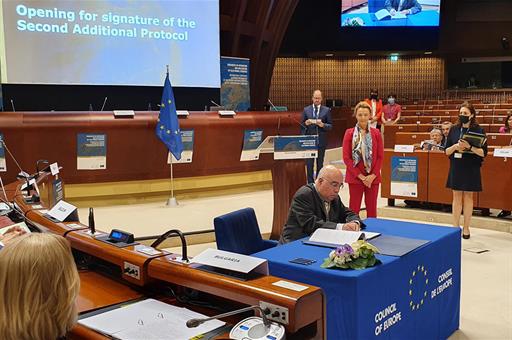The Ambassador Permanent Representative of Spain to the Council of Europe, Manuel Montobbio, signed today, on behalf of the Spanish State, the Second Additional Protocol to the Council of Europe Convention on Cybercrime, on enhanced cooperation and disclosure of electronic evidence. The text includes tools aimed at facilitating the investigation of criminal proceedings requiring transnational electronic evidence.
The Ministry of Justice has represented Spain throughout the negotiation process and has been actively involved in the drafting of the text, with the support of the Office of the Prosecutor for Cybercrime.
This Protocol, which was adopted by the Committee of Ministers of the Council of Europe on 17 November 2021, improves and complements the Council of Europe Convention on Cybercrime, signed in Budapest in 2001, as well as the additional protocol thereto, signed in Strasbourg in 2003.
Its incorporation into Spanish law will facilitate the investigation and prosecution of criminal offences, as it will provide our procedural system with new tools that speed up, facilitate and provide legal certainty for obtaining electronic evidence outside our borders.
Its content maintains all the conditions and safeguards of Fundamental Rights already included in the Convention and, in addition, complements them with a detailed regulation on the processing of personal data.
In particular, the newly signed Protocol will reinforce cooperation through a number of measures that enhance the powers of the authorities of the States Parties, notably:
- Information on Internet domain name registrations and subscriber information may be requested directly from service providers located in the territory of another State, as a form of direct cooperation with them.
- These authorities are provided with a procedural mechanism to give effect to orders issued by the authorities of another state, addressed to their service providers.
- In case of emergency, immediate assistance may be obtained from a provider in another State without the necessity of a formal request.
- Similarly, in the event of an emergency, the authorities of a State will be able to request any type of assistance in a more expeditious manner than in traditional cooperation.
- Videoconferencing and joint investigation teams adapted to the specificities of cybercrime and electronic evidence will be used.
Non official translation





